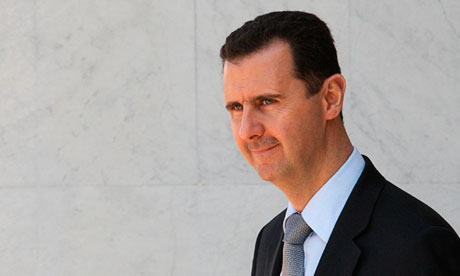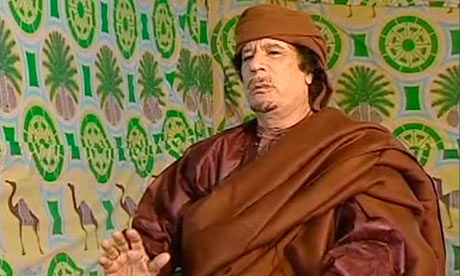From The guardian.co.uk,
Why intervene in Libya but not in Syria? A look at the two nations that have attracted international infamy
 |
| Add captionSyria's President Bashar al-Assad has been in power for 10 years. Photograph: Khaled Al-Hariri/Reuters |
Syria:
Leader President Bashar al-Assad
Time in power 10 years
Population 22.5m
GDP per capita (PPP 2010) $4,800
Oil exports (barrels per day) 0.15m
Foreign investment (latest year) $9.7bn
Military spending (2009) $2.23bn
EU arms export licences (2009) €2.7m
Libya:
Leader Colonel Muammar Gaddafi
Time in power 32 years
Population 6.6m
GDP per capita (PPP 2010) $13,800
Oil exports (barrels per day) 1.5m
Foreign investment (latest year) $6.6bn
Military spending (2009) $1.71bn
EU arms export licences (2009) €343.7m
Legality of intervention
Syria The UN security council cannot even agree on the wording of a statement condemning government violence. Russia says events in Syria do not pose a threat to global peace. Libya The UN security council authorises "all necessary measures" to protect civilians in Libya. Council members pointed to support for a no-fly zone from the Arab League to justify the decision.Balance of forces
Syria Syria's armed forces are far stronger, thought to number 325,000 regular forces and more than 100,000 paramilitary. The elite units are drawn from the same Alawite minority as the Assad family. The ruling Baath party also has stronger ideological glue holding it together than the Gaddafi cult in Tripoli. There is no sign the protesters have taken up arms in any systematic way, and they hold no territory. Libya Rebel forces had taken most of eastern Libya but were being driven back in disarray to their stronghold in Benghazi at the time the decision to intervene was taken. Gaddafi has a weak 50,000-strong army, but his paramilitary units proved more tenacious and better equipped. There were western hopes of mass defections in the armed forces and government in the face of UN, Nato and Arab resolve, but those hopes were thwarted. The regime held together and has continued to strike back. |
| Libya's President Muammar Gaddafi has been in power for 32 years. Photograph: Reuters |
No comments:
Post a Comment